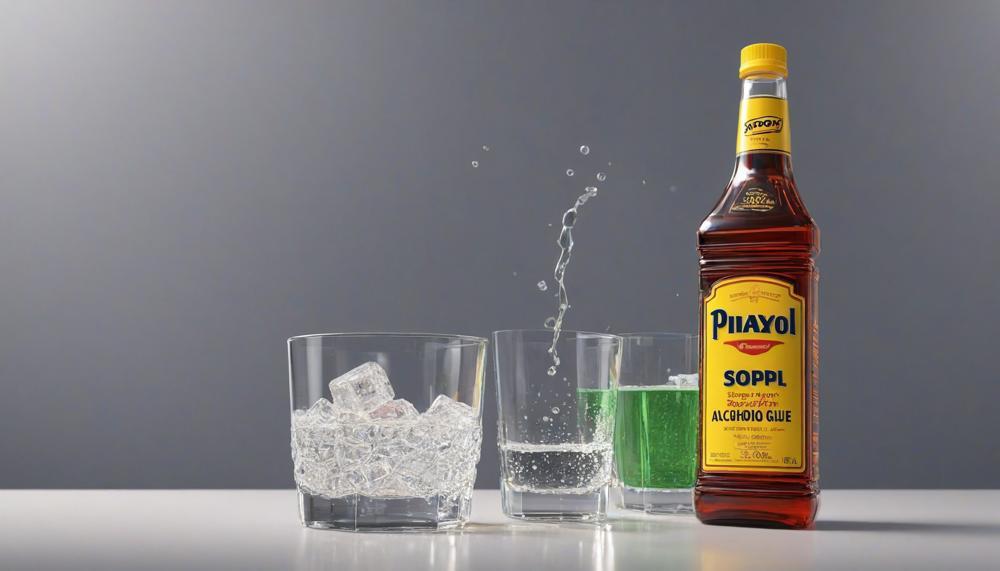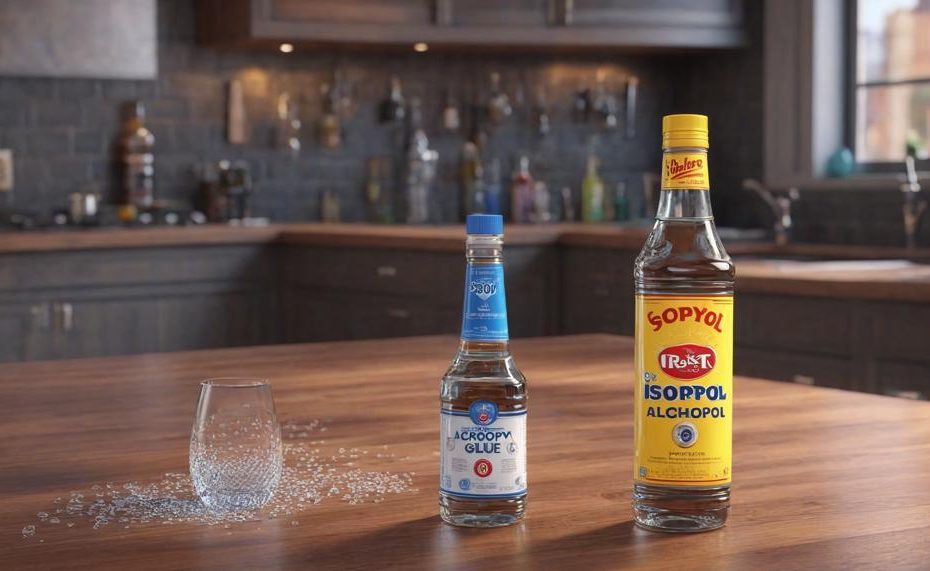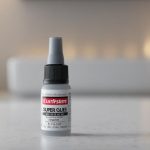Yes, isopropyl alcohol can effectively remove super glue from glasses. This common household item can dissolve the adhesive without damaging most lens materials, making it a go-to solution for many. When dealing with such a situation, it’s crucial to proceed with caution to avoid scratching or otherwise damaging the lenses. Below are some key takeaways to ensure a safe and effective removal process:
- Avoid Plastic Lenses: Isopropyl alcohol is safe for glass lenses but may cause damage to plastic lenses. If you have plastic lenses, consider alternative methods like warm soapy water.
- Gentle Application: Use a soft cloth or cotton swab dipped in isopropyl alcohol to gently rub the super glue spot. Avoid vigorous scrubbing to prevent scratches.
- Patience is Key: Allow the isopropyl alcohol to sit on the glue for a few minutes to soften it before attempting to remove it.
- Alternative Methods: If isopropyl alcohol doesn’t work or you have plastic lenses, other methods include using nail polish remover (acetone-free), soapy water, or essential oils like tea tree or eucalyptus.
- Prevent Future Mishaps: When using super glue, wrap your lenses in plastic wrap or tape to prevent accidental spills.
By following these guidelines, you can safely remove super glue from your glasses without compromising their clarity or integrity. Ready to learn more about each method? Let’s dive in.
Table of Contents [show]
What is Isopropyl Alcohol?

Isopropyl alcohol, commonly known as rubbing alcohol, is a colourless, flammable chemical compound with a strong odour. Its primary use is as a disinfectant, but it also serves as an effective solvent. This attribute makes it particularly useful for various cleaning purposes, including the removal of adhesives such as super glue from surfaces like glasses.
How Isopropyl Alcohol Works to Remove Super Glue from Glasses:
| Property | Function | Details |
| Solvent Capability | Dissolves Adhesives | Isopropyl alcohol breaks down the chemical bonds in super glue, making it easier to lift off surfaces. |
| High Alcohol Content | Effective Dissolution | With a concentration typically between 70-99%, isopropyl alcohol is potent enough to dissolve super glue efficiently. |
| Evaporation Rate | Quick Drying | It evaporates rapidly, leaving no residue, which is ideal for use on delicate items like glasses. |
| Application Methods | Versatile Use | Can be applied using cotton swabs, cloths, or wipes, allowing precise control during the cleaning process. |
| Safety Precautions | Minimizes Damage | Unlike acetone, isopropyl alcohol is safer for most lens types, especially plastic lenses. |
Step-by-Step Guide to Removing Super Glue from Glasses with Isopropyl Alcohol:
Gather Supplies:
- Isopropyl alcohol (70-99%)
- Cotton swabs or soft cloth
- A small bowl
Preparation:
- Ensure you are in a well-ventilated area.
- Protect your work surface with newspaper or a cloth.
Application:
- Pour a small amount of isopropyl alcohol into a bowl.
- Dip a cotton swab or cloth into the alcohol.
Cleaning:
- Gently rub the soaked swab or cloth over the super glue spot.
- Continue to apply alcohol and rub until the glue begins to dissolve.
Final Steps:
- Wipe away any remaining glue with a clean, dry cloth.
- Allow the glasses to air dry completely.
Isopropyl alcohol is particularly effective for this task because it dissolves the adhesive properties of super glue without damaging most types of lenses. However, always test on a small, inconspicuous area first to ensure compatibility with your specific lenses.
Types of Super Glue
There are various types of super glue available, each with distinct properties tailored for specific applications. Below is a detailed comparison of different types of super glue, focusing on their bonding strength and resistance to isopropyl alcohol.
| Type of Super Glue | Bonding Strength | Resistance to Isopropyl Alcohol |
|---|---|---|
| Regular Super Glue | Moderate – Suitable for everyday use, bonds materials like metal, plastic, rubber, ceramics, and wood. | Low – Can be broken down by isopropyl alcohol over time. |
| Industrial-Grade Super Glue | High – Offers superior bonding strength and durability, ideal for harsh environments and extreme conditions. | High – More resistant to isopropyl alcohol due to stronger chemical composition and additives. |
| Gel-Based Super Glue | Moderate to High – Effective on vertical surfaces, prevents run-off, and provides a strong bond for porous and non-porous materials. | Moderate – Better resistance than regular super glue but not as high as industrial-grade versions. |
| Plastic-Specific Super Glue | High – Designed to bond plastic materials specifically, ensuring a robust bond. | Moderate – Improved resistance to isopropyl alcohol, though prolonged exposure can weaken the bond. |
| Heat-Resistant Super Glue | High – Maintains strong bonds under high temperatures. | High – Enhanced resistance to isopropyl alcohol and other solvents. |
Factors Affecting the Removal of Super Glue from Glasses
The effectiveness of isopropyl alcohol in removing super glue from glasses can be influenced by several factors. Here’s a detailed analysis:
| Factor | Description | Impact |
| Type of Super Glue | Different super glues have varying formulations and bonding strengths. Regular super glue is less resistant to solvents compared to industrial-grade or heat-resistant variants. | Regular super glue is easier to dissolve with isopropyl alcohol, while stronger variants require more effort and time. |
| Environmental Temperature | Temperature affects the chemical activity of isopropyl alcohol. Warmer temperatures increase the solvent’s efficacy, helping it penetrate and break down the glue faster. | Higher temperatures can enhance the removal process, while colder environments may slow it down. |
| Application Technique | The method of applying isopropyl alcohol, such as using a soaked cloth versus direct pouring, influences its effectiveness. Soaking allows for better penetration into the glue. | Proper application ensures maximum contact and effectiveness of the alcohol, making the removal process smoother. |
| Alternative Methods | Using additional methods like warm water and dish soap can assist in the removal process, particularly for stubborn glue types. | Combining methods can significantly improve the effectiveness of isopropyl alcohol in breaking down the glue. |
How to Use Isopropyl Alcohol to Remove Super Glue from Glasses
When faced with super glue on your glasses, isopropyl alcohol can be your savior. Follow these steps to remove the glue without damaging your lenses or frames:
Identify Lens Type
Determine whether your lenses are plastic or glass to ensure the appropriate method and avoid damage.
Prepare the Area
Clean your glasses with a mild dish soap and warm water to remove any dirt and debris.
Soak a Cotton Ball or Swab
Soak a cotton ball or swab in isopropyl alcohol (at least 70% concentration).
Apply Alcohol to the Glue
Gently dab the soaked cotton ball or swab onto the super glue spot. Be careful to avoid spreading the glue to other areas.
Let it Sit
Allow the isopropyl alcohol to sit on the glue for about 5-10 minutes. This helps to break down the chemical bonds in the glue.
Rub Gently
After the waiting period, gently rub the glue spot with the cotton ball or swab. The glue should start to dissolve and come off.
Repeat if Necessary
If the glue doesn’t come off completely, repeat the application and gentle rubbing process.
Clean and Inspect
Once the glue is removed, wash your glasses again with mild soap and water. Inspect them to ensure all residue is gone.
Other Methods for Removing Super Glue from Glasses
There are several effective methods for removing super glue from glasses that don’t involve using isopropyl alcohol. Here are some alternatives:
Acetone
Acetone, commonly found in nail polish remover, is highly effective at dissolving super glue. Use a cotton swab to apply a small amount of acetone to the glued area. Be careful with acetone on plastic frames as it can cause damage.
Warm Soapy Water
Soaking the glasses in warm soapy water can soften the glue. Fill a bowl with warm water and add a few drops of dish soap. Let the glasses soak for several hours, then gently scrape off the softened glue with a soft cloth or your fingernail.
Petroleum Jelly
Petroleum jelly can help loosen the glue. Apply a generous amount to the glue and let it sit for several hours or overnight. Wipe off the jelly and use a soft cloth to rub away the glue residue.
Baking Soda and Cooking Oil
A mixture of baking soda and cooking oil can work as an abrasive and lubricant to remove super glue. Mix equal parts baking soda and oil to form a paste, then apply it to the glue and rub gently with a soft cloth.
Vinegar
Vinegar can break down the bond of super glue. Dampen a cloth with white vinegar and place it over the glue for several minutes. Once the glue softens, it can be gently scraped away.
Important Precautions When Using Solvents on Glasses
When using isopropyl alcohol to remove super glue from glasses, it’s crucial to observe several precautions to avoid damaging the lenses or frames.
- Test a Small Area First: Before applying isopropyl alcohol to the entire affected area, test it on a small, inconspicuous part of the glasses. This helps ensure that the solvent won’t damage the material.
- Use a Soft Cloth: Apply the isopropyl alcohol with a soft, lint-free cloth to avoid scratching the lenses or frames. Cotton swabs can also be useful for more precise application.
- Avoid Prolonged Contact: Do not let the isopropyl alcohol sit on the surface for too long. Prolonged exposure can damage the lens coatings and the frame’s finish.
- Work in a Well-Ventilated Area: Isopropyl alcohol emits strong fumes, so it’s essential to work in a well-ventilated space to avoid inhaling harmful vapours.
- Rinse Thoroughly: After removing the glue, rinse the glasses thoroughly with water and dry them with a clean, soft cloth to ensure no residue remains.
- Consult a Professional: If you are uncertain about the procedure or dealing with delicate or expensive eyewear, it’s wise to seek advice from an eyewear repair professional.
Conclusion
Removing super glue from glasses can be achieved effectively with isopropyl alcohol, a common household item known for its solvent properties. This method is particularly useful for glass lenses but should be avoided for plastic lenses due to potential damage. Here are the essential steps and considerations for using isopropyl alcohol to clean super glue off glasses:
First, gather your supplies: isopropyl alcohol (70-99% concentration), cotton swabs or a soft cloth, and a small bowl. Ensure you’re working in a well-ventilated area and protect your workspace with newspaper or a cloth.
Start by pouring a small amount of isopropyl alcohol into the bowl. Dip a cotton swab or cloth into the alcohol and gently rub it over the super glue spot. Be patient—let the alcohol sit on the glue for a few minutes to soften it before continuing to rub. This gentle application helps avoid scratching the lenses.
If dealing with plastic lenses, consider alternatives like warm soapy water or acetone-free nail polish remover. Always test on a small area first to ensure the chosen solvent does not damage the lenses.
To prevent future mishaps, wrap your lenses in plastic wrap or tape when working with super glue.






